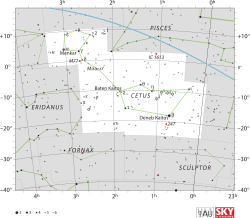Eta Ceti

| |
| Observation data Epoch J2000.0 Equinox J2000.0 | |
|---|---|
| Constellation | Cetus |
| Right ascension | 01h 08m 35.39148s[1] |
| Declination | –10° 10′ 56.1570″[1] |
| Apparent magnitude (V) | +3.446[2] |
| Characteristics | |
| Spectral type | K1 III[3] |
| U−B color index | +1.194[2] |
| B−V color index | +1.161[2] |
| Astrometry | |
| Radial velocity (Rv) | +11.74 ± 0.30[4] km/s |
| Proper motion (μ) | RA: +215.61[1] mas/yr Dec.: –139.02[1] mas/yr |
| Parallax (π) | 26.32 ± 0.14[1] mas |
| Distance | 123.9 ± 0.7 ly (38.0 ± 0.2 pc) |
| Details | |
| Mass | 1.0–1.4[5] M☉ |
| Radius | 15.10 ± 0.10[5] R☉ |
| Luminosity | 74.0 ± 3.7[5] L☉ |
| Surface gravity (log g) | 2.5[4] cgs |
| Temperature | 4,356 ± 55[5] K |
| Metallicity [Fe/H] | –0.03[4] dex |
| Rotational velocity (v sin i) | 4.8[4] km/s |
| Other designations | |
Eta Ceti (η Cet, η Ceti) is a star in the equatorial constellation of Cetus, the whale. It has the traditional name Deneb Algenubi or Algenudi. The apparent visual magnitude of this star is +3.4,[2] making it the fourth brightest star in this otherwise relatively faint constellation. The distance to this star can be measured directly using the parallax technique, yielding a value of 123.9 light-years (38.0 parsecs).[1]
This is a giant star with a stellar classification of K1 III,[3] having exhausted the hydrogen at its core and evolved away from the main sequence of stars like the Sun. (The classification is sometimes listed as K1.5 IIICN1Fe0.5, indicating a higher than normal abundance of cyanogen and iron relative to other stars of its class.)[6] It is a red clump star that is generating energy through the nuclear fusion of helium at its core.[7]
Eta Ceti may have slightly more mass than the Sun and its outer envelope has expanded to 15 times the Sun's radius.[5] It is radiating 74[5] times as much luminosity as the Sun from its outer atmosphere at an effective temperature of 4,356 K.[5] This heat gives the star the orange-hued glow of a K-type star.[8]
In culture
The name Deneb Algenubi was from Arabic ذنب ألجنبي - ðánab al-janūbii, meaning the southern tail of the sea monster. In the catalogue of stars in the Calendarium of Al Achsasi al Mouakket, this star was designated Aoul al Naamat (أول ألنعمة - awwil al naʽāmāt), which was translated into Latin as Prima Struthionum, meaning the first ostrich.[9] This star, along with θ Cet (Thanih al Naamat), τ Cet (Thalath Al Naamat), ζ Cet (Baten Kaitos) and υ Cet, were Al Naʽāmāt (ألنعمة), the Hen Ostriches.[10][11]
In Chinese, 天倉 (Tiān Cāng), meaning Square Celestial Granary, refers to an asterism consisting of η Ceti, ι Ceti, θ Ceti, ζ Ceti, τ Ceti and 57 Ceti.[12] Consequently, η Ceti itself is known as 天倉二 (Tiān Cāng èr, English: the Second Star of Square Celestial Granary.)[13]
References
- ↑ 1.0 1.1 1.2 1.3 1.4 1.5 van Leeuwen, F. (November 2007), "Validation of the new Hipparcos reduction", Astronomy and Astrophysics 474 (2): 653–664, arXiv:0708.1752, Bibcode:2007A&A...474..653V, doi:10.1051/0004-6361:20078357
- ↑ 2.0 2.1 2.2 2.3 Jennens, P. A.; Helfer, H. L. (September 1975), "A new photometric metal abundance and luminosity calibration for field G and K giants.", Monthly Notices of the Royal Astronomical Society 172: 667–679, Bibcode:1975MNRAS.172..667J
- ↑ 3.0 3.1 Gray, R. O. et al. (July 2006), "Contributions to the Nearby Stars (NStars) Project: spectroscopy of stars earlier than M0 within 40 pc-The Southern Sample", The Astronomical Journal 132 (1): 161–170, arXiv:astro-ph/0603770, Bibcode:2006AJ....132..161G, doi:10.1086/504637
- ↑ 4.0 4.1 4.2 4.3 Massarotti, Alessandro et al. (January 2008), "Rotational and Radial Velocities for a Sample of 761 HIPPARCOS Giants and the Role of Binarity", The Astronomical Journal 135 (1): 209–231, Bibcode:2008AJ....135..209M, doi:10.1088/0004-6256/135/1/209
- ↑ 5.0 5.1 5.2 5.3 5.4 5.5 5.6 Berio, P. et al. (November 2011), "Chromosphere of K giant stars. Geometrical extent and spatial structure detection", Astronomy & Astrophysics 535: A59, arXiv:1109.5476, Bibcode:2011A&A...535A..59B, doi:10.1051/0004-6361/201117479
- ↑ Eggleton, P. P.; Tokovinin, A. A. (September 2008), "A catalogue of multiplicity among bright stellar systems", Monthly Notices of the Royal Astronomical Society 389 (2): 869–879, arXiv:0806.2878, Bibcode:2008MNRAS.389..869E, doi:10.1111/j.1365-2966.2008.13596.x
- ↑ Puzeras, E. et al. (October 2010), "High-resolution spectroscopic study of red clump stars in the Galaxy: iron-group elements", Monthly Notices of the Royal Astronomical Society 408 (2): 1225–1232, arXiv:1006.3857, Bibcode:2010MNRAS.408.1225P, doi:10.1111/j.1365-2966.2010.17195.x
- ↑ "The Colour of Stars", Australia Telescope, Outreach and Education (Commonwealth Scientific and Industrial Research Organisation), December 21, 2004, retrieved 2012-01-16
- ↑ Knobel, E. B. (June 1895), "Al Achsasi Al Mouakket, on a catalogue of stars in the Calendarium of Mohammad Al Achsasi Al Mouakket", Monthly Notices of the Royal Astronomical Society 55: 429, Bibcode:1895MNRAS..55..429K, doi:10.1093/mnras/55.8.429
- ↑ Allen, R. H. (1963), Star Names: Their Lore and Meaning (Reprint ed.), New York: Dover Publications Inc., p. 162, ISBN 0-486-21079-0, retrieved 2010-12-12
- ↑ η Cet as Aoul al Naamat or Prima Struthionum (the first ostrich), θ Cet as Thanih al Naamat or Secunda Struthionum (the second ostrich), τ Cet as Thalath al Naamat or Tertia Struthionum (the third ostrich), and ζ Cet as Rabah al Naamat or Quarta Struthionum (the fourth ostrich). υ Cet should be Khamis al Naamat or Quinta Struthionum (the fifth ostrich) consistently, but Al Achsasi Al Mouakket designated the title the fifth ostrich to γ Gam with uncleared consideration.
- ↑ (Chinese) 中國星座神話, written by 陳久金. Published by 台灣書房出版有限公司, 2005, ISBN 978-986-7332-25-7.
- ↑ (Chinese) 香港太空館 - 研究資源 - 亮星中英對照表, Hong Kong Space Museum. Accessed on line November 23, 2010.
| ||||||||||||||||||||||||||||||||||||||||||||||||||||||||||||